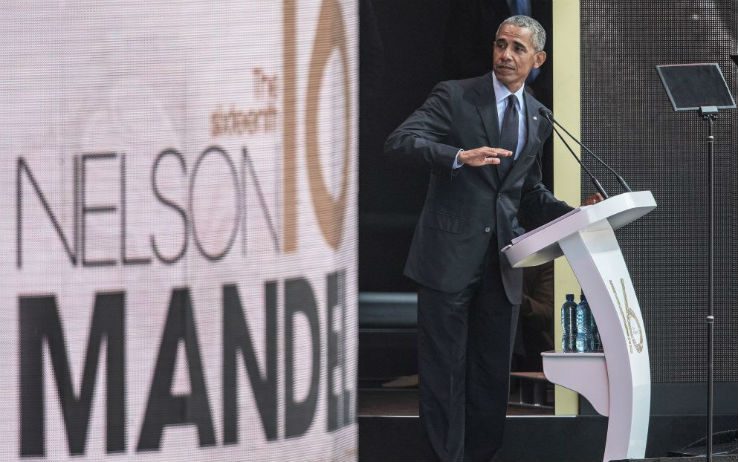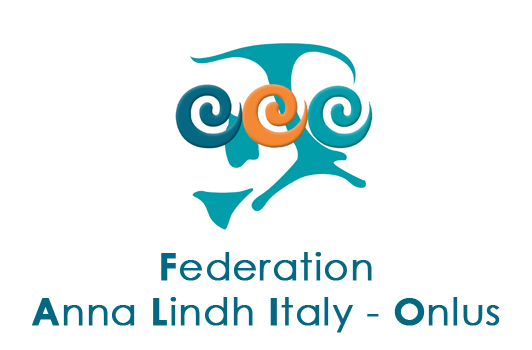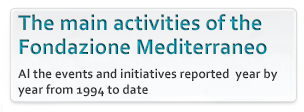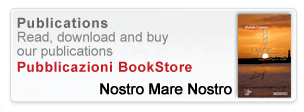|
18 July 2018

On the occasion of the celebrations for the centenary of the birth of Nelson Mandela, President Michele Capasso presented the WORLD PEACE FORUM based on the values of equality and respect for human rights at the base of the life of the South African president who died in 2013.
The Councilor for the City of Naples Alessandra Sardu stressed the importance of the initiative and the role of the City of Naples to ensure the due success.
At the end of the work, an invitation was made to the representatives of the institutions and associations present to collaborate on this significant event for Italy and for the city of Naples.
|
18 July 2018

The president of the Fondazione Mediterraneo Michele Capasso spoke at the initiative of the Municipality of Naples for the centenary of the birth of Nelson Mandela.
Coordinated by Alderman Alessandra Sardu, the mayor of Naples Luigi De Magistris and the Ambassador of the Republic of South Africa to Rome Shirish M.Soni participated.
On this occasion the values of equality and acceptance at the base of Mandela's life and action were underlined.
THE FONDAZIONE MEDITERRANEO PARTICIPATED IN THE CELEBRATIONS FOR THE CENTENARY OF THE BIRTH OF NELSON MANDELA
|
17 July 2018

A delegation of the Fondazione Mediterraneo participated in the celebrations on the occasion of the centenary of the birth of Nelson Mandela.
President Capasso recalled the two meetings with the South African president and the indelible teaching that traced the meaning of the Foundation's life and action.
Of particular importance is the speech given by Barak Obama: the former US president at Wanderers Stadium has launched an appeal for equality, change, hope, tolerance, and inclusion by referring to the values for which he has fought throughout the life of the South African leader, inviting the world to take an example from the Nobel Peace Prize passed away on December 5, 2013.
Obama focused on the inequalities that afflict "many developing countries where riches end up in the pockets of the same people, strengthening the pattern of inequities and fueling corruption". A problem that, according to the former president, emerges even more "in the United States and in Western countries where the economic insecurity of middle-class families, of those who work in factories, on farms has grown. of millions of people are ignored, while few individuals hold too many powers, too much influence in the media and in economic life ".
At the Wanderers Stadium in Johannesburg, the former president invited citizens all over the world to "believe in the facts", with a call for realism and against fake news. "Without the facts there is no basis for collaboration, if I say this is a podium and you say it's an elephant it will be difficult for us to collaborate." Among the crowd, who arrived early in the day to listen to him, there were also distinguished guests including Mandela's last wife, former Liberia president Ellen Johnson Sirleaf, former UN secretary general, Koffi Annan, and the former Italian prime minister Matteo Renzi.
|
15 July 2018

The exhibition "Civilizzarel'urbano" ended with a great success for visitors in view of the 60th anniversary of the Pica Ciamarra Associati study.
Meetings, seminars, conferences and events have marked two months of activities to the Museum of Peace - MAMT.
|
14 July 2018

The president of the Michele Capasso Foundation participated in the "National Day of the French Republic", present - among others - the prefect of Naples Carmela Pagano and the Mayor of Naples Luigi De Magistris.
The president of the Fondazione Mediterraneo Michele Capasso has joined other representatives of institutions and organizations in paying tribute to the Consul General of France in Naples Jean-Paul Seytre who leaves his post after 3 years.
President Capasso recalled the fruitful and continuous collaboration that led to the organization of important events for the Euro-Mediterranean dialogue.
The mayor of Naples, Luigi De Magistris, donated to the Consul the medal of the city and a plaque "For the passion, the abnegation and the sense of duty. For having developed and strengthened the cooperation between Naples and France ". Before the ceremony, which was also given the honor to the French military, the concert of Tunisian singer M'Barka Ben Taleb who with his group proposed "Sous le ciel de paris: a mix of Mediterranean rhythms and melodies.
|
14 July 2018
 During a friendly meeting with the Mayor of Naples Luigi de Magistris, President Michele Capasso illustrated the WORLD PEACE FORUM by announcing an agreement with the University of Naples and the City of Naples.
During a friendly meeting with the Mayor of Naples Luigi de Magistris, President Michele Capasso illustrated the WORLD PEACE FORUM by announcing an agreement with the University of Naples and the City of Naples.
|
14 July 2018

The president of the Fondazione Mediterraneo Michele Capasso has joined other representatives of institutions and organizations in paying tribute to the Consul General of France in Naples Jean-Paul Seytre who leaves his post after 3 years.
President Capasso recalled the fruitful and continuous collaboration that led to the organization of important events for the Euro-Mediterranean dialogue.
The mayor of Naples, Luigi De Magistris, donated to the Consul the medal of the city and a plaque "For the passion, the abnegation and the sense of duty.
For having developed and strengthened the cooperation between Naples and France ". Before the ceremony, which was also given the honor to the French military, the concert of Tunisian singer M'Barka Ben Taleb who with his group proposed "Sous le ciel de paris: a mix of Mediterranean rhythms and melodies.
|
12 July 2018

The EuroMeSCo annual conference “Changing Euro-Mediterranean Lenses” brought together over 160 researchers, decision-makers, academics and representatives of civil society from 25 countries in the Euro-Mediterranean area to challenge some ideas that underpin Euro-Mediterranean relations.
In Euro-Mediterranean fora indeed, the focus is often on the state of the South and Southeast part of the Mediterranean and its impact on the European Union. In turn, this conference focused on how recent developments in Europe affect the southern shore of the Mediterranean and more generally Euro-Mediterranean relations. Similarly, Euro-Mediterranean policies are too often understood as policies of the European Union towards the Southern Mediterranean.
Therefore, this conference also looked at policies and strategies developed by southern Mediterranean countries vis-à-vis the EU and other partners.
The conference was co-organized by the European Institute of the Mediterranean (IEMed) and the OCP Policy Center.
The Fondazione Mediterraneo, co-founder of the network, and the Federazione Anna Lindh Italy took part in the work.
|
12 July 2018
 The EuroMeSCo network - of which the Fondazione Mediterraneo is part from the beginning - held a meeting in Rabat ".
The EuroMeSCo network - of which the Fondazione Mediterraneo is part from the beginning - held a meeting in Rabat ".
More than 40 young researchers discussed the Euro-Mediterranean themes.
On this occasion, the EuroMeSCo network welcomed 6 new members.
|
11 July 2018

This year Omer Dudic will finally be able to bury his dear dead in the genocide. The remains of his brother Nijazija and his sister-in-law Remzija, who was six months pregnant at the time, were recognized thanks to the DNA analysis in the Tuzla identification center and their names appear on the list of 35 people buried on 11 July 2018 during the celebrations for the anniversary of the Srebrenica massacre.
"In those days of 1995 I was just twenty years old - he tells visibly moved - and I managed to save myself by miracle, fleeing through the woods and walking for over a hundred kilometers barefoot. Since then I have never stopped looking for my relatives ". Today Omer is a farmer in Osmace, a village not far from Srebrenica, surrounded by the green countryside surrounding the Drina valley, on the border between Bosnia and Serbia. It is hard to believe that only a few years ago such a silent and poetic place was the scene of a ferocious ethnic cleansing. Of the approximately one thousand inhabitants who lived here at the time, there are only about eighty now.
A few scattered houses inhabited mostly by some elderly widow, a memorial to the victims of the war and around expanses of fields as far as the eye can see. Fields that could be cultivated, if only there were still the arms to do it. From here you get to Srebrenica in less than half an hour, descending along the road that Ratko Mladic and his troops of executioners traveled after the definitive fall of the city. The physiognomy of the small downtown square has recently been modified by an impressive red building that houses a hotel and a Turkish bank. Next to it, the minaret of the main city mosque is dominated by the dome of the Orthodox church. After what happened in the first half of the 1990s, the cohabitation between the Serbian community and the Muslim minority is a daily challenge. The latter, too, is now bothered by the noisy celebrations machine that is activated every year on 11 July, the annual parade of international delegations, the spotlights that come on for half a day and then go off again until the following year. "It is true, this will be the first anniversary after Mladic's conviction and the closing of the Hague Court of Justice - recognizes Bekir, who was a child during the war - but here the news of convictions come as a distant echo, which does not it shifts the daily balances of ordinary people ".
The survivors and relatives of the victims are forced to live every day with the memory of the genocide and to deal with a moral and material reconstruction that even after so many years is still struggling to take off.
"The process of reconciliation continues to be hampered by nationalist ideologies that throw salt on the wounds of a drama begun long before what the world remembers," explains Hasan Hasanovic, curator of the documentation center of the Potocari memorial, in which he is buried his father too. The siege of the Serbian nationalists in the city began on a spring day of twenty-five years ago, in 1993. "The UN had negotiated a cease-fire, the people thought they could take a breath and we children went out to play football in the schoolyard - he remembers - but suddenly, from the surrounding mountains, grenades began to rain on the city. One hit the playing field in full and exploded a few meters away from me ».
That day Hasan saved himself by miracle but saw fourteen of his classmates die. The slaughter that would have taken place two years later also marked the failure of the international community, as also recalled by the photographic exhibition set up in the premises of the former UN base of Potocari.
With the 35 burials this year, the total burial will exceed 6,800 but the long process to restore an identity to the remains of more than eight thousand victims continues, also because the woods around Srebrenica continue to return the bones buried in the mass graves.
Dragana Vucetic, a forensic anthropologist from the research center on missing persons in Tuzla, confirms that there are about a thousand victims still to be identified.
The Fondazione Mediterraneo, founded precisely to help the victims of the war in the former Yugoslavia, is at the side of these tormented populations.

































